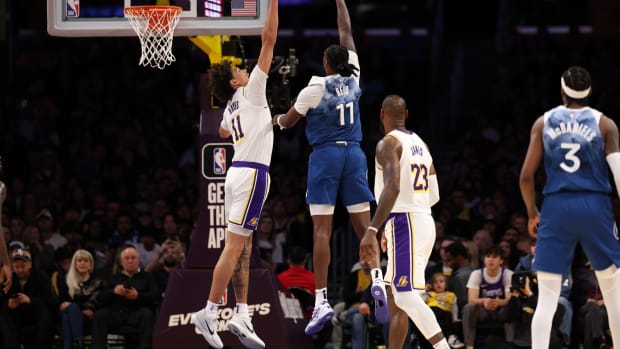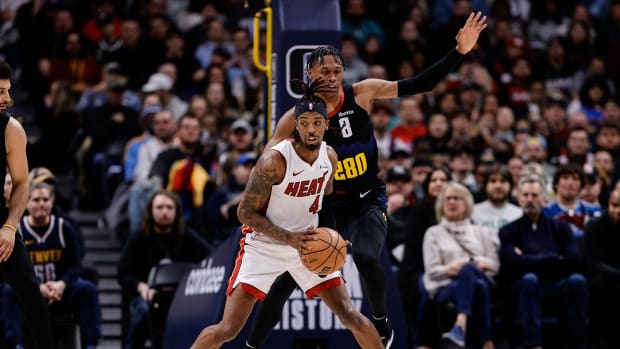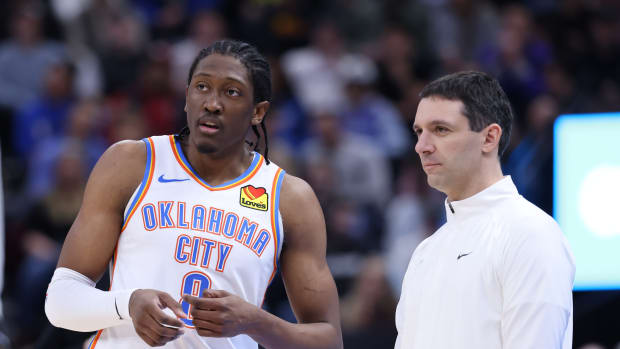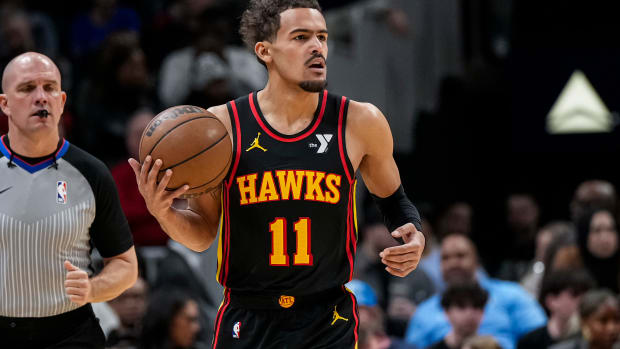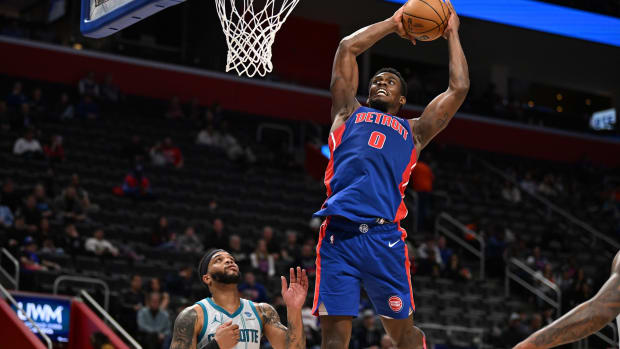Ray Allen Q&A: New Book, Celtics Break-Up and Game 6 Memories
Ray Allen is ready to tell all.
The NBA’s all-time leader in three pointers and Hall-of-Fame lock has authored a book—with a foreword from Spike Lee!— detailing his life and career. From the Outside: My Journey Through Life and the Game I Love will dive deep into Allen’s transformation from a star at UConn to a lethal threat in the NBA, with much more in between. Oh, and expect some words on his departure from the Celtics, too.
Allen last played in the NBA in 2014 with the Miami Heat, only officially announcing his retirement in November 2016 after flirting with championship contenders as a free agent. Since hanging up his shooting sleeve, Allen has kept busy traveling the world and the spending time with his children.
“People always ask me if I’m going to get into coaching,” Allen told The Crossover. “I have four young boys. That’s my team right now. I have to make sure I have an impact on them.”
In anticipation of his memoir, Allen caught up with us to discuss why he didn’t come back for one more season, his Game 6 shot against the Spurs, and more.
RohanNadkarni: The last time we saw you on the court was the 2014 NBA Finals, and I think we all expected you would come back. Was there one big reason why you decided to end your career at that point?
Ray Allen: Well, I think as much as people still wanted me out on the floor, and I’ve always prided myself on the type of shape I was in, so I never looked at it as I was wearing down or getting tired. But I did play 18 years. And 18 years is a long time. I had to work twice as hard just to stay in front of everything, and the recovery gets tougher. And it was harder because as much as I was putting in, I wasn’t getting out of it. And I had to decide if I wanted to play again, I was living in Miami, and the team broke up. Miami became younger so that wasn’t an option, so if I played it was going to be for a team that had a chance to win. So that was going to require me to pick up and move. I wasn’t sure if I was willing to do that. I had already moved my kids. There wasn’t a situation where I could put myself in where I had the opportunity to win and I was going to be able to play. It was going to be a new city to move my family to, it was going to be an adjustment around me. I didn’t want to have to put them in that predicament. I sat back, waited and watched to see if anything made sense, but at the end of the day, it wasn’t worth it for me to move my kids again and then possibly be in a situation I wasn’t really happy with.
RN: Dwyane Wade described the last year of the Big Three as a “bad marriage.” What was the vibe on that team? Was that year tougher than most on all the guys?
RA: It certainly was tough on all of us as players. Organizationally, I don’t think they ever adjusted. Most of the guys, having gone to so many Finals, me being an older player, having played a lot of basketball the last five, six years, organizationally and coaching wise they didn’t adjust. We had the oldest team in the NBA, and on top of that, we had such a bad schedule. Every holiday we were away from home. Every situation we were in we were fighting to just stay above board, trying to figure out how to sleep or rest our bodies. We wore down, we were tired, and we were definitely tired at the end. We still were good, and we still made it to the Finals.
RN: In what way do you mean the organization didn’t adjust?
RA: With a team as old as we were, and with as much basketball as we’d played, we were still doing a million appearances, we still were having all the practices, and doing all the things that typically wear you down by the end of the year. Just being on your feet so much. The team didn’t learn how to manage our bodies better. When your players have played in June the last three or four years, by this time you have to figure out how get people off their feet. We don’t need to have a practice. We don’t need to have a shootaround. We just have to be mental. From those aspects, you wear yourself down long term.
RN: NBA fans have discussed a lot over the years what happened to your Celtics teammates after you left Boston. You and Paul Pierce had a chance to hash things out this summer. How much of a relief was that for you to get the ball rolling with Paul?
RA: It’s not something that I was worried about, let’s put it like that. I just set out to have a conversation with him. It was coincidental that we were there. I didn’t need to do interviews on TV or try to defend myself. I won a championship when I left, and that’s all of our objectives when we sign up to be a part of a sports team.
RN: Was there anything that was said over the years that hurt you?
RA: Well, we just finished writing the book and I will certainly talk about it. That’s something I’m going to talk about in-depth in my book.
RN: It was almost a novelty to shoot threes the way you did for parts of your career. Now you see some teams shooting almost 40 a night. Do you ever wish you could play in this era where you could shoot even more?
RA: I started in an era when coaches pretty much hated the three and wanted you to do everything else. The game has certainly evolved. When we were young, we were excited that we were getting the salaries that we were getting and some of the older players would be in the league and say, “Wow, these guys are getting paid this much money!” But now that same thing is happening over again. It’s just the generation you’re in, you have to take care of it and grow it for the next generation. Hopefully you had an impact on the game while you played it. And in my era or while I played, it’s important to say that. Because regardless of what happens to any record I had, in my era, while I played I held a few NBA records.
RN: You were always a legend for the work you put in before games. Where did your work ethic come from? What experiences helped build that mindset?
RA: I learned from other people’s examples. I don’t know where I got it from, but I always learned to look around me and see things people did do and the things people didn’t do and allowed that to influence me as a player. I just knew that I was always afraid to fail. I was afraid of not being good. I always had this thought that tomorrow I wouldn’t make a shot. I wasn’t going to make another shot. Whether it was a free throw or three pointer. So the first thing in the morning I would wake up and go right to the gym. Because I felt like if I didn’t go do it I was going to suck the next night. There was this constant cloud over my head. I had to go the gym to make it work and make it happen.
RN: You’ve been a little bit more outspoken politically since you retired. Obviously it’s a crazy time, and you see players and coaches in the NBA speaking constantly. What do you think of that mix of sports and politics? Are you more comfortable speaking out?
RA: I feel extremely comfortable. People try censor me all the time on social media. “You need to stick to basketball!“ “I’m not following you anymore because you’re getting political.” And it amazes me that somebody would tell you to say only what they want to hear. The fact that I speak up against any politician or government official—it’s our duty as Americans to hold the people in office accountable. When I say something on social media, this is not for the Allen household. This is for the people of America. We all have to stand up. I don’t believe it’s getting political when you say something that’s for the greater good. You’re just being a concerned citizen. That’s what a democracy is all about. And for somebody to come on my wall, on any social media, and say “stick to basketball,” it’s an insult and I’m very offended. We as athletes, many of us have foundations, we have families, we are philanthropic in the communities that we live in. We have a stance, we have beliefs. We play basketball at a high level but it’s offensive if that’s all you think we care to talk about.
C.J. McCollum Q&A: The NBA's Most Media-Savvy Star
RN: Some people hail the NBA as the most progressive sports league. Do you find that to be the case? Or do you hope to see even more coming from the NBA?
RA: If you look around professional sports, you see athletes from lots of sports stepping up and speaking out. One thing about athletes in general is, no matter what’s happening in government, we are the voice of the people. Just like when you do media, you’re asking us questions because there are things fans want to know, they want answers. When we step up and speak out, we hold the mantle for a lot of people and how they feel. Because they may not have they voice or the podium to be able to speak out.
When I speak out against something I don’t believe in, it’s not because I’m a millionaire or because I’m an NBA player. I’m not saying it because I’m comfortable. We speak out because, even with all the money we make, we all have poor family members. We all have cousins, aunts, uncles, who aren’t as well off. Yeah, we help out as much as we can, but you can’t help everybody out. We want to make sure the system works for them. We want to make sure that programs are in place to help those less fortunate. We see people in America who are struggling. It’s not that we want to give things away to them, and we want to be a kickstand for them. Some people just don’t have the opportunity that others have. Some people are born 50% through the race. Some people start in the negative. If it doesn’t get level, we at least want to give people a chance to at least get into the race.
RN: What do people ask you about more, He Got Game or the Game 6 shot?
RA: You know, that’s a good question. I would say, recently it’s more of the Game 6 shot. Interestingly enough, people always ask me if I remember it. I’m like, “Uh, which shot are you speaking of? I don’t know which one you’re talking about.” Do I remember it? Somebody did this huge picture and I have it on on the wall in my house. It’s boarded all over the wall. We actually forget that it’s there half the time. For me it’s not about the shot as much as the preparation. That lifelong preparation that went into me being in that situation. I think it’s the Game 6 shot more than anything that people ask me about. They always tell me where they were when it happened. It’s pretty interesting, as much as I hit the shot, it’s more about where people were and how it affected their life more than anything else.
RN: What was going through your mind when you told security to get those ropes off the court?
RA: It’s like one of those situations when you get sick, and you focus more. That’s kind of where our mindset was. We were in a really tough situation. Typically when you’re in a tough situation, things start to splinter. People start pointing fingers. People figure out ways to make things worse. In basketball, everybody wants to do it themselves. You want to take that shot to get the lead back. We circled the wagons and got more focused. It was anger, but it was a focused anger. Everybody knew what we had to do. And we couldn’t sit back and play the woe is me card.
































